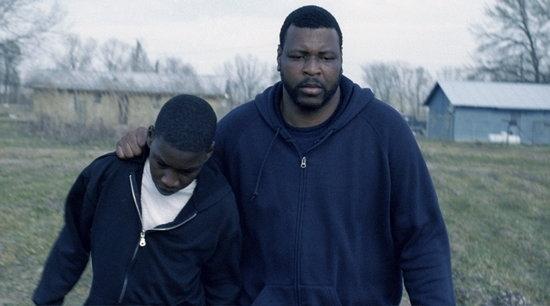The opening images have mighty symbolic heft. A boy dashing across a blasted wintry field compels a flock of birds to take to the air, hundreds if not thousands of them blackening sky and screen, squawking and flapping in cacophonous unison. Cut to a freight train, truck after truck, thundering under clouds across the barren land. Cut to two plastic deer parked outside a wooden prefab. By the end of this brief montage it is clear we are being invited into a world from which, for its tragic human inhabitants at least, there is no chance of escape.
Ballast, from first-time director Lance Hammer, is a work of quiet rage – for the first 15 minutes, extremely quiet. This is a place where people, trapped in a private space by loneliness and poverty, don’t tend to open their mouths much. A white man knocks on a door and pushes into a house, where he finds two heavy-set black men, one dead in bed, the other catatonic with grief. No sooner has the intruder called for an ambulance than the other man has dashed outside and shot himself. Unsuccessfully.
In rapid cuts, he is restored to health in the same noisy hospital where his brother’s body lies mute on the mortuary slab, then sent home to resume his moribund existence. Lawrence’s home – it’s as much as the narrative can do to give him a name - is one of a pair of houses on the edge of a field in the Mississippi Delta. Cars roar by incuriously. His only visitor is the boy we glimpsed in that opening sequence, now pointing his own pistol at him and demanding money. It emerges that he is sticking up his uncle, that the dead man was his estranged father, and that he is hock to drug runners who are punitive when reimbursement fails to materialise.
Watch the opening montage in the trailer for Ballast
And so, one jigsaw piece at a time, a portrait of a fractured family – and beyond it, a wounded society – emerges. Marlee, a single mother abandoned by the father of her child, scrubs latrines for a living, every day leaving her friendless son James to get up to no good. When she loses her job and James is physically threatened, she goes into hiding in the empty house next door to Lawrence who, being her ex-husband's twin, brings out her inner hellcat.
Ballast was shot in 2006 and shown at Sundance as far back as 2008 and, while it has been picking up rave notices on the festival circuit ever since, it has waited this long for a UK release on grounds that seem inexplicable. Hammer, who wrote, directed and most importantly edited Ballast down to its barest bones, is a born poet who works carefully with elemental clay. He has a small budget but a big imagination and bigger empathy. The three main characters, occupants of a pitiless rain-lashed hinterland on the edge of the bayou, easily bear the weight of a mythic story that feels much greater than the scope of small lives narrowed by economic disadvantage.
 What is all the more extraordinary is that they are played by non-professional actors. There isn’t a trace of mannerism or inauthenticity in either Micheal J Smith Snr’s Lawrence, mumbling and heavy with the lassitude of sorrow, or JimMyron Ross’s withdrawn, poker-faced James. It’s no surprise that, as Marlee, Tarra Riggs (pictured with Ross) is the one who has gone on to act professionally: hers is the kinetic corner of this stricken triangle, the catalyst fired up by the all-American spirit of entrepreneurial self-improvement. Her performance even has the odd show-pony moment you could actually stick on a showreel.
What is all the more extraordinary is that they are played by non-professional actors. There isn’t a trace of mannerism or inauthenticity in either Micheal J Smith Snr’s Lawrence, mumbling and heavy with the lassitude of sorrow, or JimMyron Ross’s withdrawn, poker-faced James. It’s no surprise that, as Marlee, Tarra Riggs (pictured with Ross) is the one who has gone on to act professionally: hers is the kinetic corner of this stricken triangle, the catalyst fired up by the all-American spirit of entrepreneurial self-improvement. Her performance even has the odd show-pony moment you could actually stick on a showreel.
The film has some thematic overlap with Winter’s Bone, another snapshot of the barely peopled moral wasteland that is backwoods America. There are drugs but somehow there is also decency and the possibility of redemption, although in the first hour of Ballast you’d be hard pressed to work out where. Having established an atmosphere of brutal Hardyesque sadism in which characters are trapped by remorseless fate, the film sets about looking for scraps of hope in the rubble of derelict lives. The ending is tentative, open-ended, antepenultimate. But it hints at the possibility of a healing major chord (although it goes without saying that there is nothing so ornamental as a soundtrack).
Occasionally you do wonder: is the film too still, too introverted, too in love with its unembellished austerity? But Hammer's aesthetic choices, matched by the sparse, washed-out camerawork of Lol Crawley, stem from honesty. Ballast is about people who have nothing, who subsist - as the title hints - below the waterline. The source of its raw power puts you in mind of a catchphrase that once helped a champion of the downtrodden into the White House. It's the economy, stupid.













Add comment